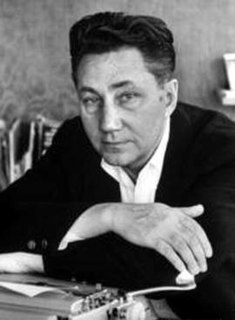A Quote by Peter De Vries
He resented such questions as people do who have thought a great deal about them. The superficial and slipshod have ready answers, but those looking this complex life straight in the eye acquire a wealth of perception so composed of delicately balanced contradictions that they dread, or resent, the call to couch any part of it in a bland generalization. The vanity (if not outrage) of trying to cage this dance of atoms in a single definition may give the weariness of age with the cry of youth for answers the appearance of boredom.
Quote Topics
About
Acquire
Age
Answers
Any
Appearance
Atoms
Balanced
Bland
Boredom
Cage
Call
Complex
Composed
Contradictions
Couch
Cry
Dance
Deal
Definition
Dread
Eye
Generalization
Give
Great
Great Deal
Life
Looking
May
Outrage
Part
People
Perception
Questions
Ready
Resent
Single
Straight
Superficial
Them
Those
Thought
Trying
Vanity
Wealth
Weariness
Youth
Related Quotes
Anarchism as the name for an ideal total social form is a really complicated question. I have never found satisfying answers from anarchists about the definition of the state they are opposed to. Most are opposed to coercive forms of state power. Questions about large scale systems of organization and how they will be funded - those are questions it's hard to get anarchists to give good answers to.
I feel like people expect me to give them easy answers, but there aren't really easy answers. There are only harder questions. And unless we get to the harder questions part, about what this conversation is really about...of course I want an immigration bill to pass. I want people to have a driver's license and work permits and green cards and passports. But this conversation transcends this bill. We're not going to have a perfect bill. This is politics. I feel like my job is instead of giving people easy answers, my job is to actually to ask people to probe deeper.
See to it, night and day, that you pray for your children. Then you will leave them a great legacy of answers to prayer, which will follow them all the days of their life. Then you may calmly and with a good conscience depart from them, even though you may not leave them a great deal of material wealth.
Perhaps we are looking at this from a wrong perspective; this search for the truth, the meaning of life, the reason of God. We all have this mindset that the answers are so complex and so vast that it is almost impossible to comprehend. I think, on the contrary, that the answers are so simple; so simple that it is staring us straight in the face, screaming its lungs out, and yet we fail to notice it. We're looking through a telescope, searching the stars for the answer, when the answer is actually a speck of dirt on the telescope lens.
I read once, which I loved so much, that this great physicist who won a Nobel Prize said that every day when he got home, his dad asked him not what he learned in school but his dad said, 'Did you ask any great questions today?' And I always thought, what a beautiful way to educate kids that we're excited by their questions, not by our answers and whether they can repeat our answers.
[Steven Spielberg's films] are comforting, they always give you answers and I don't think they're very clever answers. The success of most Hollywood films these days is down to fact that they're comforting. They tie things up in nice little bows and give you answers, even if the answers are stupid, you go home and you don't have to think about it. The great filmmakers make you go home and think about it.







































